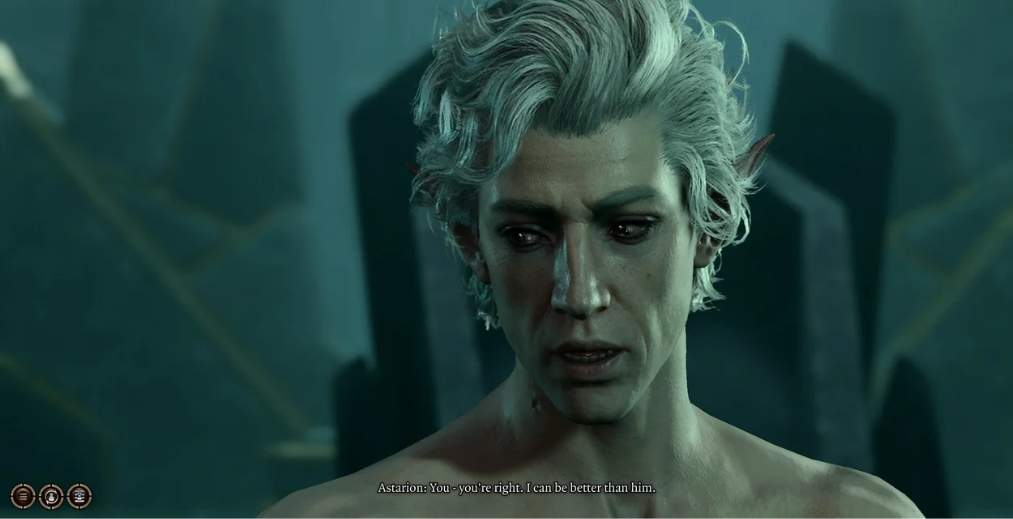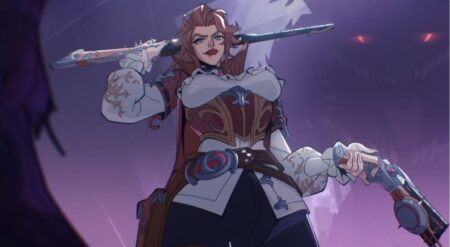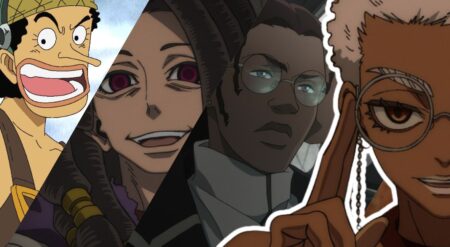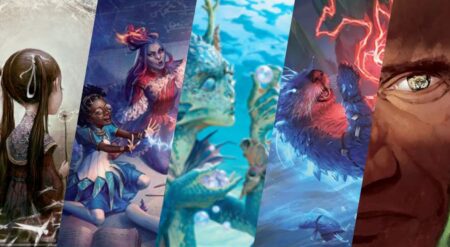CONTENT WARNING: This piece contains discussion of sexual assault, domestic abuse, and trauma. It also contains Astarion romance spoilers for Baldur’s Gate 3.
Larian Studios’ Baldur’s Gate 3 has exceeded expectations for fans who wanted an immersive game-playing experience that feels like a great game of Dungeons & Dragons. While gorgeous graphics and brilliant design make the experience extra wonderful, the writing and voice acting make Faerûn really come to life, especially when it comes to the characters. There’s the complexity of Shadowheart’s lost memories and conflict of faith, Gale Dekarios’s desire for greatness, Wyll’s father-inspired identity crisis, and more. Then, there’s Astarion.
Voice actor Neil Newbon won Best Performance at The Game Awards 2023 for his portrayal of the sarcastic and dagger-happy vampire spawn, and his performance is truly incredible. His inflection in the line reading of just the word “…shit” upon being discovered trying to snack upon the player character in the middle of the night makes me laugh, even though I’ve played through it around a dozen times. Astarion was clearly a character created with a lot of love, and that ended up meaning the world to some players. I’m one of them.
You see, I’m a survivor of sexual assault and domestic violence. I have Post-Traumatic Stress Disorder (PTSD) and all that goes with it. This means that for me, stories surrounding those topics can range from wildly cathartic to deeply triggering. When I played through Baldur’s Gate 3 and my Tav (a Dark Urge half-Drow named Killia, if you’re curious) romanced Astarion, it started out like many other fictional romances I had played in a game. Still, by the end, I felt both seen by the game and those who made it and was a little bit in love with the pixelated paramour for real, as silly as that might sound.

No matter what, the player’s first interaction with Astarion is adversarial. From the start, he attacks you with a knife while on the road near the game’s starting point. From there, he’s equal turns flirtatious and cruel, and though it’s possible to have sex with him in Act 1 pretty darn quickly, he’s still exceptionally closed-off. The physical action of sex didn’t really create any intimacy, and Astarion still seems cold. Then he started to open up and revealed to my Tav that the vampire who spawned him, Cazador, would force him to seduce new victims for Cazador to feed on. I immediately recognized how massive that revelation was.
Astarion wasn’t just being a distant, sarcastic jerk for giggles but as a defense mechanism. He has trust issues because he is traumatized by his service under Cazador and, despite acting wildly arrogant, actually has a broken sense of self-worth. Astarion did what he had to to survive and considers himself a monster because of it. So, why not act the part?
There is a pivotal scene in Act II where the party meets a Drow named Araj, who works in blood magic. She wants Astarion to bite her and offers a reward if he does. Astarion is disgusted by the idea because her blood smells tainted. If you allow him to make his own decision and defend him from Araj’s advances, there’s a cutscene where Astarion fully divulges his trauma.
“I spent 200 years using my body to lure pretty things back for my master,” he says. “What I wanted, how I felt about what I was doing, it never mattered. You could have asked me to do the same. To throw myself at her, what I wanted be damned. But you didn’t. And I’m grateful.”
I felt a deep ache when I heard those words. I understand intimately what it felt like to have your own desires and feelings completely ignored, your body just a tool for someone else’s use. Like Astarion, the person who abused me had power over me. Though it wasn’t as intense as a literal vampire master, it made thinking for myself a potentially dangerous prospect. As much as I had liked Astarion before that moment when I heard those words, I felt a part of myself echoed. When asked why he slept with the player in Act 1, Astarion says that he needed protection and it was an easy way to get someone in the party to trust him.

It’s a line of thinking that’s immediately recognizable to many, especially those who have traditionally been in submissive roles in relationships who have some kind of trauma. There’s a desperate need to be safe and to feel wanted, and Astarion quickly puts his body back on the line to try and achieve that safety. When he ends up falling for the player, he’s surprised by it. He’s even a little embarrassed, it seems.
Sex and relationships have been entirely transactional for him, a means to an end, and opening up and having something real is a shock to him. The player can choose to hug Astarion to show him that there is love without expectations and that there can be physical contact without sexual connotations. The real intimacy comes in the trust it takes to be truly vulnerable with someone else and to return that vulnerability in kind, not from any physical act. Astarion shares his feelings, saying, “I have no idea what we’re doing, or what comes next. But I know that this. This is nice.”
Tears welled in my eyes as I remembered my own first moment of real tenderness after years of abuse, a moment when my now-husband just held me and reassured me during a PTSD-triggered panic attack. Being able to provide that kind of comfort to someone else, albeit a fictional character, was exceptionally cathartic. It made me want to keep playing as much as I could, to protect Astarion and my Tav and their love for one another against all odds.
I’m not a particularly romantic person, but for the 50-odd hours I played that Baldur’s Gate 3 run, I was a total sap for the romance between my Tav and Astarion. In a cutscene where Astarion said that he trusted my Tav, I felt like when Humphrey Bogart told Ingrid Bergman, “Here’s looking at you, kid,” in Casablanca. In the world of domestic abuse survivors, “I trust you” means more than a million “I love yous,” and someone who wrote for the game clearly knew that.

When Astarion finally goes to confront Cazador, he discovers that the countless victims he brought to the vampire weren’t actually killed, but turned into spawn like himself and kept in cells. His guilt intensifies and can be used to push him toward sacrificing them all to become a kind of super-vampire in Cazador’s place or remaining cursed with his current affliction and setting them free. Though I never lured anyone to a vampire’s lair, I definitely knew the feeling of survivor’s guilt, of feeling awful when I had to prioritize my own survival, and others were left behind.
Astarion’s feelings at discovering the spawn are understandable, and his incredible rage towards Cazador is relatable. There is incredible catharsis to be found in violently ending Cazador’s reign and setting the spawn free, giving them the same chance Astarion himself was given. It’s rare that many of us will ever get a chance to confront our abusers, and we shouldn’t stab them to death. But in a completely fictional context it is a wonderful way to psychologically purge some of that pain.
There are a lot of great moments in all of the Baldur’s Gate 3 romances, and I imagine some are equally validating for players with different life experiences. Karlach and Gale both work as allegories for what it’s like to have a potentially terminal illness, for example, and they also have a tremendous amount of care put into their romances. Each of the main romanceable NPCs has some form of trauma that they’re dealing with, and instead of making the game feel unnecessarily dark, it makes the character arcs feel deeper and the stakes of the romances higher.
There has been some criticism and pushback against trauma-informed writing in fiction, but what Larian has done is genuinely impressive. The characters’ traumas never feel overwrought and inform the decisions they make and their behaviors, from Shadowheart’s secretive nature to Astarion’s quips. Each character is imbued with incredible pathos that makes every player decision really count. I spent more time going back to quicksaves to avoid “Astarion disapproves” than I did going back for better battle outcomes, and there are plenty of memes out there to make me believe I’m not the only one.

I’m generally a film and television writer and have grown used to having passionate, emotional experiences in those mediums. I’ve also had profound experiences playing pointed indie games like This War of Mine and Hellblade: Senua’s Sacrifice. However, I never expected to have such intense feelings playing a classic role-playing game on my PC. Baldur’s Gate 3 is an artistic accomplishment in many ways, but its emotional impact is something that deserves more discussion.
Sure, it’s fun to do things like point out how hilariously desperate Gale seems (he’s on the rebound from a situationship with a goddess, give the man a break) or simply thirst after how physically attractive everyone is. I also want to see more praise and understanding of the depth of the writing and voice-acting. Creative careers are in danger of being replaced by artificial intelligence, including writers and actors of all kinds, and the kind of care that went into making Baldur’s Gate 3 what it is couldn’t possibly be done by a machine. The nuance needed to deftly write these characters in a way that makes them compelling and relatable requires experience and feeling — something a machine will never have, no matter how many algorithms it runs.
In the end, this is my love letter not only to Astarion but to all of the incredible flesh-and-blood human beings who brought him to life. From the designers who put all of the fun little details into his clothes and appearance to the writers who made him feel as real as you or me, to Neil Newbon, who showed real vulnerability in his performance, Baldur’s Gate 3 wouldn’t have been the same without you. Thank you for making this survivor feel seen and for making me fall in love with video games all over again.
Baldur’s Gate 3 is available now on PC, PlayStation 5, and Xbox Series X|S.







